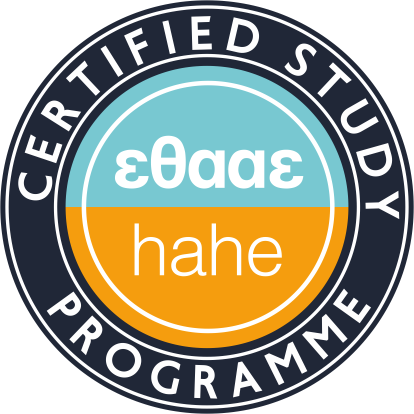MSc in Current Food Technology. I) Dairy Science & Technology II) Oenology
Curriculum – Specializations
MSc in CURRENT FOOD TECHNOLOGY: I) DAIRY SCIENCE AND TECHNOLOGY II) ŒNOLOGY is structured in twodinstict specializations:
Α. Dairy Science and Technology
Β. Œnology
In order to obtain the MSc degree, postgraduate students must attend the courses presented below along with seminar lectures by experts from the food industry, Universities, Research Centers and public authorities. Moreover, postgraduate students are required to do a 2-month compulsory Internship in food producing companies or food consulting companies or food certification agencies or laboratories. A total of 90 ECTS are required to obtain the MSc degree.
The teaching language of the MSc Program is Greek whereas the working language of the MSc thesis can be either Greek or any otherEULanguage (if decided by the Department’s General Assembly).
According to the MSc Curriculum attending courses is mandatory and every module is equivalent to thirty nine (39) teaching hours.
The analytic Curriculum is structured as follows:
I) Specialization – Dairy Science
The 1stacademic semester includes five (5) courses, chosen by and assigned to the students by the Coordinating Committee depending on the students’ background, and seminars, totaling thirty (30) ECTS.
The 2ndacademic semester includes six (6) specialization courses, five of which are compulsory and one elective, and seminars, totaling thirty ECTS (30).
|
1st Semester |
2nd Semester |
||
|
MODULES |
ECTS |
MODULES |
ECTS |
|
Experiment Design and Analysis |
4 |
Dairy Technology |
7 |
|
Food Chemistry |
6 |
Cheese Science and Technology |
7 |
|
Food Biochemistry |
6 |
Regulations and Control of Dairy Products |
4 |
|
Food Microbiology and Applied Microbiology |
6 |
Sensory Analysisof Dairy Products |
2 |
|
Food Engineering |
6 |
Production Line Design – Feasibility Study |
4 |
|
Legislation and Food Safety Management Systems (HACCP) |
6 |
Dairy Products Development (Elective) |
4 |
|
Food biopolymers |
4 |
Dairy Industry Waste Management (Elective) |
4 |
|
Dairy Chemistry, Biochemistry and Analysis |
7 |
Food Businesses Economics (Elective) |
5 |
|
Dairy Microbiology |
7 |
||
|
Milk Production Management |
6 |
||
|
FoodPhysical Properties |
4 |
||
|
Seminars |
2 |
Seminars |
2 |
|
TOTAL ECTS |
30 |
TOTAL ECTS |
30 |
II) Specialization –Œnology
The first academic semester includes four (4) courses, chosen by and assigned to the students by the Coordinating Committee depending on students’ background, and seminars, totaling thirty (30) ECTS.
The second academic semester includes seven (7) specialization courses and seminars, totaling thirty (30) ECTS.
The Curriculum of the Œnology Specialization has been structured in accordance to the requirements of the new regulation passed by the International Organisation of Vine and Wine (Training programs for Œnologists - Resolution OIV/ECO 563/2016). The graduates of the Œnology Specialization possess the formal and substantive qualifications,provided by the 1697/1987 Law, for the Professional Practice of Œnology.
|
1st Semester |
2nd Semester |
||
|
MODULES |
ECTS |
MODULES |
ECTS |
|
Wine Technology I |
7 |
Wine Technology II |
6 |
|
Wine Microbiology – Fermentation Technology |
7 |
Legislation for Vine &Wine & Spirits Production |
5 |
|
Grape & Wine Chemistry – Methods of Analysis |
7 |
Alcoholic Beverages |
4 |
|
Viticulture for Winemakers I |
5 |
Wines & Beverages Marketing |
4 |
|
Wines and Beverages Tasting |
2 |
Viticulture for Winemakers II |
4 |
|
Food Engineering |
6 |
Financial Management of Wineries and Distilleries |
3 |
|
Experiment Design and Analysis |
6 |
Wines and Spirits Tasting |
2 |
|
Food Chemistry |
4 |
||
|
Food Biochemistry |
4 |
||
|
Legislation and Food Safety Management Systems (HACCP) |
6 |
||
|
Seminars |
2 |
Seminars |
2 |
|
TOTAL ECTS |
30 |
TOTAL ECTS |
30 |
3d Semester – Common for both Specializations
The 3rdacademic semester includes the Internship (8 ECTS), seminars (2 ECTS) and the implementation of the MSc Thesis (20 ECTS), totaling thirty (30) ECTS.
|
3d Semester |
ECTS |
|
MSc Thesis |
20 |
|
Internship |
8 |
|
Seminars |
2 |
|
TOTAL ECTS |
30 |
For the ŒnologySpeialization part-time study of up to six (6) academic semesters is available.

